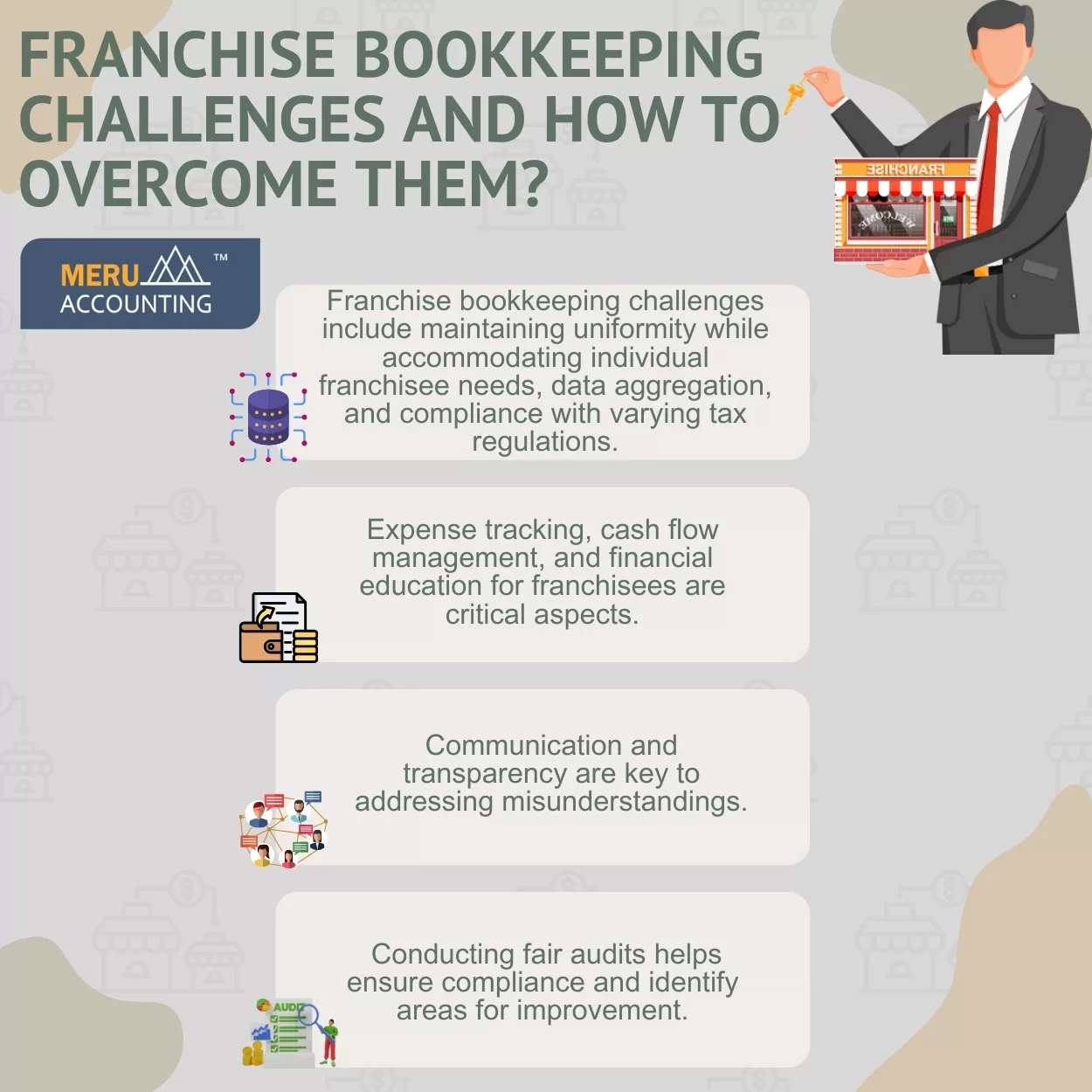Home » Franchise Bookkeeping Challenges and How to Overcome Them?
Franchise Bookkeeping Challenges and How to Overcome Them?
Franchise businesses offer entrepreneurs the opportunity to operate under an established brand, benefiting from proven business models and support systems. However, managing the financial aspects of a franchise can be challenging due to the complexities and unique dynamics involved. In this blog, we’ll explore some common challenges that you may face while bookkeeping for franchisees and provide strategies to overcome them.
Challenges and Solutions in Bookkeeping for Franchisees:
Here are some common challenges in bookkeeping for franchisees and their solutions:
Uniformity vs. Flexibility
Challenge: Franchise businesses must maintain uniform financial records to comply with franchise agreements and to ensure consistency across all locations. However, individual franchisees may have unique financial needs and circumstances.
Solution: Implement standardized systems and tools for bookkeeping of franchisees that are adaptable to individual franchise requirements. Provide training and support to franchisees in using these tools to maintain consistency while allowing some flexibility.
Data Aggregation and Reporting
Challenge: Collecting financial data from multiple franchise locations and consolidating it for reporting can be time-consuming and error-prone.
Solution: Invest in robust accounting software or cloud-based systems that allow for real-time data synchronization from all franchise locations. Automate data aggregation to streamline the reporting process and reduce the risk of errors.
Compliance with Tax Regulations
Challenge: Franchisees may operate in different regions with varying tax regulations, making it challenging to ensure compliance.
Solution: Work with tax professionals who have expertise in both federal and local tax laws. Regularly update franchisees on tax changes and provide them with resources to help them adhere to tax regulations.
Expense Tracking
Challenge: Monitoring and controlling expenses across various franchise locations can be daunting.
Solution: Implement clear expense tracking guidelines and policies. Use expense management software to monitor and analyze spending patterns. Encourage franchisees to review and approve expenses regularly, and provide feedback on cost-saving opportunities.
Cash Flow Management
Challenge: Variations in sales and expenses among franchise locations can make cash flow management challenging.
Solution: Develop cash flow forecasting models that consider location-specific factors. Encourage franchisees to maintain cash reserves and establish lines of credit to cover unexpected expenses. Regularly review and adjust cash flow projections based on actual performance.
Financial Education for Franchisees
Challenge: Not all franchisees have a background in finance, which can result in misunderstandings or mismanagement of financial aspects.
Solution: Offer financial training and resources to franchisees, ensuring they have a basic understanding of bookkeeping and financial management. Provide ongoing support, including access to financial experts, to help them make informed decisions.
Communication and Transparency
Challenge: Franchisees may feel disconnected from the franchisor’s financial operations, leading to misunderstandings and conflicts.
Solution: Establish open lines of communication with franchisees. Provide regular financial reports, hold meetings, and create a collaborative environment where franchisees can ask questions and express concerns. Transparency can help build trust and alignment.
Audit and Compliance Reviews
Challenge: Franchisors often conduct audits to ensure compliance with franchise agreements and financial standards.
Solution: Conduct regular, fair, and transparent audits while communicating the purpose and outcomes clearly to franchisees. Use audits as an opportunity to identify areas for improvement and share best practices.
Franchise bookkeeping challenges demand a blend of technology, education, and communication. Outsource your franchisee bookkeeping to Meru Accounting and strengthen the financial performance of your business.
FAQs
- What is the main challenge in franchise bookkeeping?
Franchise bookkeeping must balance uniform records with each location’s unique financial needs. - How do franchise owners manage different tax laws?
They work with tax experts and share clear updates on local and federal tax changes. - What helps franchises collect and report financial data?
Use cloud accounting software that syncs data from every location in real time. - Why is tracking expenses harder in franchise setups?
Each location spends differently, which makes it harder to track and control costs. - How can franchisees handle uneven cash flow?
They should forecast based on local trends and keep cash reserves or credit lines. - What kind of financial training do franchisees need?
They need simple training that explains bookkeeping and key financial tasks clearly. - How can franchisors improve financial communication?
They must share reports, answer questions, and hold meetings on a regular basis. - Why do franchisors conduct financial audits?
Audits help check agreement rules and show where franchisees can improve systems.



